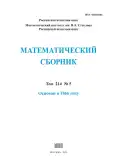Vol 214, No 5 (2023)
On Arf-invariants in the codimension $1$ in a Wall group of the dihedral group
Abstract
An element
 3-17
3-17


A refinement of Heath-Browns theorem on quadratic forms
Abstract
In his paper from 1996 on quadratic forms Heath-Brown developed a version of the circle method to count points in the intersection of an unbounded quadric with a lattice of small period, when each point is assigned a weight, and approximated this quantity by the integral of the weight function against a measure on the quadric. The weight function is assumed to be C∞0-smooth and vanish near the singularity of the quadric. In our work we allow the weight function to be finitely smooth, not to vanish at the singularity and have an explicit decay at infinity.
The paper uses only elementary number theory and is available to readers with no number-theoretic background.
 18-68
18-68


The theorems Levinson's type and Dynkin's problems
Abstract
Questions relating to theorems of Levinson-Sjöberg-Wolf type in complex and harmonic analysis are explored. The well-known Dyn'kin problem of effective estimation of the growth majorant of an analytic function in a neighbourhood of its set of singularities is discussed, together with the problem, dual to it in certain sense, on the rate of convergence to zero of the extremal function in a nonquasianalytic Carleman class in a neighbourhood of a point at which all the derivatives of functions in this class vanish.
The first problem was solved by Matsaev and Sodin. Here the second Dyn'kin problem, going back to Bang, is fully solved. As an application, a sharp asymptotic estimate is given for the distance between the imaginary exponentials and the algebraic polynomials in a weighted space of continuous functions on the real line.
 69-96
69-96


Combinatorial invarian for gradient-like flows on connected summ of $\mathbb{S}^{n-1}\times \mathbb{S}^1$
Abstract
We obtain necessary and sufficient conditions for the topological equivalence of gradient-like flows without heteroclinic intersections defined on the connected sum of a finite number of manifolds homeomorphic to Sn−1×S1, n≥3. For n>3, this result extends substantially the class of manifolds such that structurally stable systems on these manifolds admit a topological classification.
 97-127
97-127


About some classes of almost Hermitian structures, which realized on $S^6$
Abstract
Structures of cohomogeneity one on
 128-139
128-139


Slim exceptional sets of Waring-Goldbach problems involving squares and cubes of primes
Abstract
Let
 140-152
140-152











